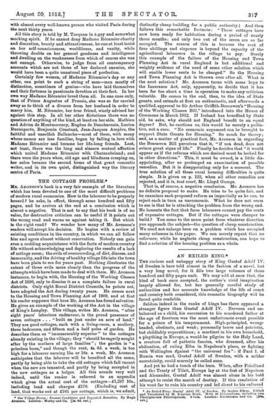THE COTTAGE PROBLEM.*
Mn. Anoarsoia's book is a very fair example of the literature which has been devoted to one of the most difficult problems of modern rural economics. How is the labourer to be properly housed ? he asks, in effect, through some hundred and fifty pages, and he arrives at the end at a conclusion which is almost a negative. That is not to say that his book is of no value, for destructive criticism can be useful if it points out the wrong road and warns us against taking it. But which is the right road? We wonder how many of Mr. Aronson's readers will accept his decision. He begins with a review of existing conditions in the country, in which we can all follow him and agree almost without reservation. Nobody can gain even a nodding acquaintance with the facts of modern country life without acknowledging and deploring the results of a lack of cottage room; the evils of overcrowding, of dirt, disease, and immorality, and the driving of healthy village life into the town have been plain to see for years past. Nothing illustrates the extent of these evils more clearly than the progress of the attempts which have been made to deal with them. Mr. Aronson instances, to begin with, the Housing of the Working Classes Act of 1890, only to dismiss it as a complete failure in rural districts. Only eight Rural District Councils, he points out, have adopted the Act during twenty years. He comes next to the Housing and Town Planning Act of 1909, and at first his reader supposes that here Mr. Aronson has found salvation. He gives an example of the working of the Act in the village of King's Langley. This village, writes Mr. Aronson, " after eight years' laborious endeavour, is the proud possessor of seven cottages . . . " built on just under an acre of land." They are good cottages, each with a living-room, a scullery, three bedrooms, and fifteen and a half poles of garden. He describes them as " immeasurably superior " to the cottages already existing in the village ; they " should be eagerly sought after by the mothers of large families " ; the garden is " a priceless boon," and though the rent, 4s. 6d. a week, is too high for a labourer earning 15s. or 16s. a week, Mr. Aronson anticipates that the labourer will be benefited all the same, partly by being able to take the old cottages which fall vacant when the new are tenanted, and partly by being accepted in the new cottages as a lodger. All this sounds very well indeed, until the reader is referred to an appendix which gives the actual cost of the cottages-21,297 10s., including land and charges £170. (Excluding cost of land, that -works out at 2161 per cottage, which is, we admit, Our Village Homes: Present Conditions and Suggested Remedies. By Hugh Aronson. London : Murby and Co. [2s. 6d. net.]
distinctly cheap building for a public authority.) And then follows this remarkable footnote : " These cottages have now been ready for habitation during a period of nearly three months ; and only two out of the seven are so far occupied. The reason of this is because the rent of four shillings and sixpence is beyond the capacity of the
agricultural labourers in the village to pay. Surely this example of the failure of the Housing and Town Planning Act in rural England is but additional and weighty evidence of the need of some other solution which will enable lower rents to be charged." So the Housing and Town Planning Act is thrown over after all. What is the next solution ? Mr. Aronson turns with some hope to the Insurance Act, only, apparently, to decide that it has been for too short a time in operation to make any criticism valuable. He comes in the end, then, to the idea of State grants, and extends at first an enthusiastic, and afterwards a qualified, approval to Sir Arthur Griffith-Boscawen's "Housing of the Working Classes Bill," introduced into the House of Commons in March 1912. If Ireland has benefited by State aid, he asks, why should not England benefit to an equal degree? But, he cautions us, this would be merely a pallia- tive, not a cure. " No economic argument can be brought to support State Grants for Housing." So much for theory ; and, as a matter of Practical fact, Mr. Aronson in regarding the Boscawen Bill perceives that it, " if not dead, does not evince great signs of life." Finally he decides that " it would appear as if the reforms which are desired must be looked for in other directions." This, it must be owned, is a little dis- appointing, after so prolonged an examination of possible remedies. But it is disappointing only for a moment. The true solution of all these rural housing difficulties is quite simple. It is given on p. 123, when all other remedies are rejected, and it is, tout court, Mr. Lloyd George.
That is, of course, a negative conclusion. Mr. Aronson has no definite proposal to make. He tries to be quite fair, and he examines each proposed reform as impartially as he can, to reject each in turn as uneconomic. What he does not seem to see is that he is attacking the problem from the wrong end. He laments the fact that farm labourers cannot pay the rents of expensive cottages. But if the cottages were cheaper to build ? You come to the same point from whatever direction you approach the subject—the question of cheap construction. We need not enlarge here on a problem which has occupied many columns in this paper. We can merely repeat that no reformer, while he neglects cheap construction, can hope to find a solution of the housing problem as a whole.


































 Previous page
Previous page